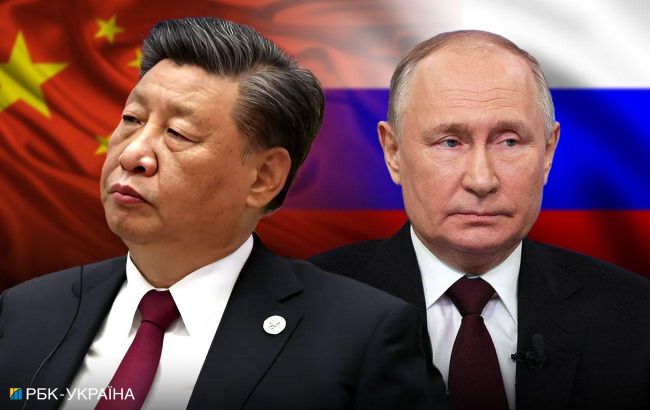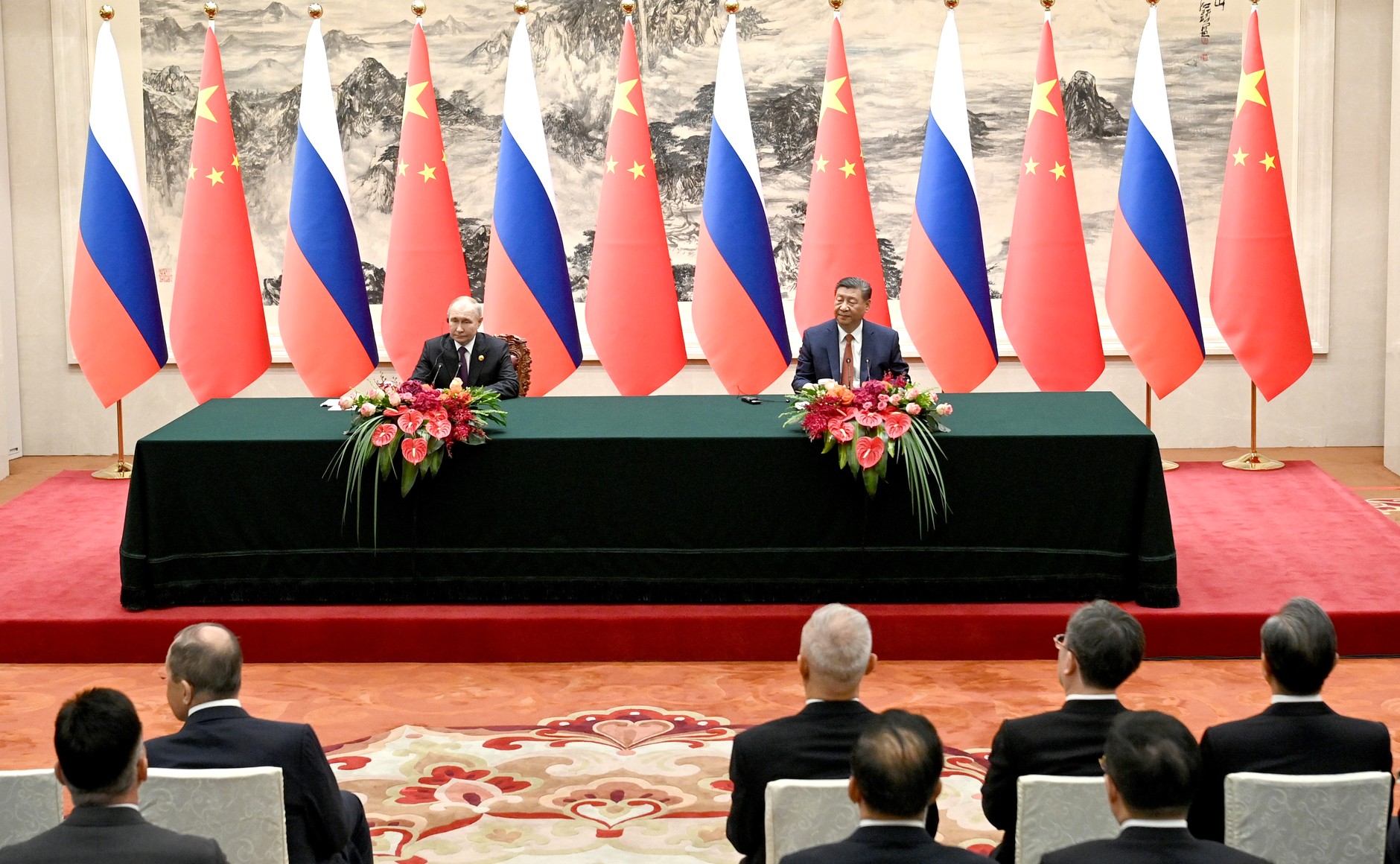'Perfect couple': Russia's dependence on China and what happens if Beijing abandons Moscow
 Chinese leader Xi Jinping and Vladimir Putin (photo: RBC-Ukraine collage)
Chinese leader Xi Jinping and Vladimir Putin (photo: RBC-Ukraine collage)
After the invasion of Ukraine, Russia has been actively building up relations with China, trying to show the West a new Eastern alliance as opposed to NATO and the European Union. RBC-Ukraine analyzes whether Beijing sees it this way, whether Russia can be called dependent on China, and what will happen if Xi Jinping stops supporting Putin.
Sources: Statements of the Russian and Chinese leadership, data from open trade statistics, exclusive comments by the Ambassador of Ukraine to China Pavlo Riabikin, and expert of the Ukrainian Institute for the Future Iliya Kusa.
Contents:
- Chinese and Russian approaches to West: Difference
- Market relations: Is Russia so dependent on China?
- Will Russia survive without China?
In May, Russian President Vladimir Putin traveled to Beijing to meet with Chinese leader Xi Jinping once again. The program of the trip was not much different from the previous two visits since the start of Russia's full-scale invasion of Ukraine, with Putin talking about the brotherly friendship between Russia and China, and Xi talking about the demonstrative cooperation between the two great powers.
After Russia invaded Ukraine, the Kremlin began looking for situational allies. But while rogue countries like Iran and especially the DPRK are not taken seriously by global geopolitical players, China is a powerful ally. Therefore, Moscow is trying to create the illusion that its aggressive actions are supported by good neighborly relations with Beijing. At the same time, China itself does not seek to demonstratively take sides but rather maintains peacekeeping neutrality.
Chinese and Russian approaches to West: Difference
Back in Soviet times, it was hard to imagine that in the twenty-first century, the Russian President would host the Chinese leader with caviar and sturgeon and that Beijing would sing 'The Volga River Flows' during the Kremlin's visit. At that time, Russian-Chinese relations could hardly be called good neighborly, as evidenced by posters of that era with inscriptions such as 'Repulse the Beijing Aggressor!'.
As time passed, China more or less established relations with the United States, the Soviet Union collapsed, and the newly formed Russia needed a strong ally. In the 1990s, Moscow was still broadcasting rather pro-Western narratives, and at that time, according to various sociological studies, Russians were more suspicious of the Chinese than the Americans.
While Beijing was finally establishing itself as one of the strongest economies in the world, anti-Western sentiment was gradually growing in Russia. All things considered, this became the basis for the current, as Xi Jinping himself calls them, exemplary relations between Moscow and Beijing.
But there are several key differences between China's attitude toward the West and Russia's attitude toward it. While the Russian Federation claims to be at war with almost the entire collective West, China shares the Western arena, says Iliya Kusa, an expert at the Ukrainian Institute for the Future.
"They do not consider the West a military enemy, and they are not going to fight it. Moreover, they would not want to. Plus, they consider Europe a partner. And, judging by Xi Jinping's recent European tour, confirms this position that the United States is their main rival. They see Europe as a necessary partner with whom they want to be friends and with whom they link the future of their economic development," Kusa says in a commentary to RBC-Ukraine.
_1.jpg) Chinese leader Xi Jinping with French President Emmanuel Macron (Photo: Getty Images)
Chinese leader Xi Jinping with French President Emmanuel Macron (Photo: Getty Images)
At the same time, both countries are in ideological rivalry with the United States. For China, it is a tradition to act as a so-called counterweight to America, a major geopolitical player that wants to be taken into account and respected. Russia generally strives for the same thing but chooses radically different methods. While Beijing backs up its ambitions with economic development and diplomacy, Moscow uses exclusively militaristic rhetoric. That is why Putin's visits to Xi do not lead to anything radical-China is not taking sides, trying to play the classic role of global mediator.
"And in this regard, they are no different from most countries of the so-called global south. This fits very well with their foreign policy logic, which is that China should come to global influence by unarmed means, like the United States. For this purpose, they need to improve their reputation, and image, and be more active in the political sphere," Kusa says.
Moscow, on the other hand, is trying to build a different picture of the dialog with Beijing - full support, understanding, and alliance. In this way, Russia wants to show Washington, first and foremost, that its coalition with China is a powerful answer to Western NATO, the EU, and other influential alliances. It is not for nothing that in almost every speech Putin emphasizes the current unipolarity of the world and his desire to turn it into a multipolar one, forgetting to clarify that the main field of influence should still be in Moscow.
In this context, the Kremlin's efforts to pretend that it is an equal partner with China look rather silly. When Putin comes to Beijing, the Russians create a picture that he has come to their great ally, and they discuss together how to confront the West. The Chinese version is likely to be about world peace. It is very clear here that China does not view Russia as an equal state, but rather as a junior partner in all respects and nothing more.
Moreover, it cannot be argued that the Chinese, while not criticizing Russia for its expansionist policy, support it. According to experts, it would have been better for Beijing if there had been no war at all. China's current rhetoric does not involve itself in any large-scale geopolitical conflicts. But at the same time, for the Chinese, Moscow appears as a battering ram, exposing weaknesses within Western alliances. And China has an interesting opportunity to observe this from the sidelines. In addition, joining the anti-Russian sanctions could be interpreted as submission to the will of the United States, and secondly, it would mean the loss of one of its trading partners. At the same time, according to Ukraine's Ambassador to China Pavlo Riabikin, more and more Chinese want Ukraine to defeat Russia.
"Speaking about Chinese sentiments and understanding of the reasons for Russia's invasion of Ukraine, I would not say that everyone in China believes that Ukraine or NATO was provoking Russia. More and more Chinese are drawing their conclusions and want to defeat the aggressor. Of course, there are also many who, despite the obvious facts, support Russia," Riabikin says in a commentary to RBC-Ukraine.
However, China is one of Russia's main allies in the war against Ukraine. Moscow, under the yoke of sanctions, was forced to reconfigure its market and direct its flows to the East. Therefore, after the start of the Russian invasion, Sino-Russian trade and economic relations have strengthened. In addition, Beijing supports Russia's military sector, but not through direct supplies of its equipment, but through safer methods.
Market relations: Is Russia so dependent on China?
The Russian-Chinese partnership today affects several areas at once, from trade and economic to political. Moscow is using this trump card to its fullest potential.
"Regarding the assistance that China provides to Russia, it is worth mentioning the high level of political contacts, the development of practical cooperation in many areas, and the increase in trade volumes - all of which allow Russia to feel confident in the international arena, to have a wide market for its goods, especially energy resources, as well as a source of supply of the necessary products," Riabikin says.
After the West imposed sanctions on trade relations with Russia, effectively isolating it from its market, China became one of Moscow's most important partners. This resulted in a record level of trade between Russia and China in the first year of the war. Its amount exceeded $190 billion, an increase of almost 30%. The trend continued in the following period. The Kremlin, of course, played up this, calling the increase impressive and claiming that this was what they had been seeking.
 Chinese cars are actively capturing the Russian market (Photo: Geely-grand.ru)
Chinese cars are actively capturing the Russian market (Photo: Geely-grand.ru)
The main share of trade between Russia and China is in energy resources: oil, gas, and coal. In 2022, this group of goods accounted for more than 70% of total supplies to China from Russia. At the same time, Russia exports the same oil to China through gray schemes, such as the shadow tanker fleet. It uses it to bypass the price ceiling of $60 per barrel. Today, the Chinese market accounts for about 40% of energy exports. Before the war, it was 20%, meaning that Russia began to depend on China here as well.
Another area of cooperation is automobiles, and here we can also talk about dependence. "The Russian market is almost completely monopolized by the Chinese. After the war broke out, many Western automakers simply left the market and did not supply their cars, at least not directly to Russia," Kusa notes.
But the most important thing for Ukraine is military technology. China is not flooding the Russian military-industrial complex with its equipment, but it is doing a lot to help Moscow circumvent sanctions. Thanks to Beijing, the Russian Federation can obtain dual-use goods using Chinese companies as proxies or through banal smuggling.
In this regard, China helps Russia more than others because it can allow a large amount of sanctioned goods to pass through. But Beijing would not share military technology directly, as there is too much danger of being on the sanctions list itself.
It is not yet possible to talk about Russia's total dependence on the Chinese market - Moscow is still trying to diversify its trade flows, and China is approaching trade with Russia cautiously. But this does not exclude the fact that without Chinese assistance, it would be much more difficult for the Kremlin to feed its war machine.
Will Russia survive without China?
Xi Jinping has very clearly outlined his red lines in Russia's war against Ukraine. The first and foremost is a ban on the use of nuclear weapons. "If we try to define the red line, I think it is indeed the use of nuclear weapons. Let us recall that Russia's verbal nuclear blackmail in 2022 subsided after China declared not only the inadmissibility of the use of nuclear weapons but also the threat of their use," Riabikin says.
The last thing China needs is a nuclear conflict - it doesn't fit their peacekeeping rhetoric and will force them to intervene. Another less obvious red line from Xi is to localize the military conflict and prevent it from escalating into something larger. But this line also intersects with nuclear blackmail.
"They would not want the war in Ukraine to go beyond the region, to destabilize the region, to affect more countries. In their opinion, the more countries are involved in the war, the greater the risk of a major war and, in fact, the use of nuclear weapons," Kusa says.
Russia, according to analysts, is afraid of China and ideally would not want to depend on it, but has no other choice. If we imagine that Moscow crosses the red lines or China decides that it is now more profitable for it to join the Western majority and start supporting Ukraine at least in the political arena, Russia will have a hard time.
It will take Moscow some time to find new trading partners and reorient the market. Some of Russia's flows may be able to be transferred through Central Asia. That is, the sharp absence of Chinese support will certainly not work immediately, but it will inevitably lead to a collapse for Russia - the corridor of possibilities will narrow significantly, the amount of resources needed for the war will decrease, and, accordingly, the Russian army will either have to take a stand in a blind defense and forget about any offensive, or urgently initiate negotiations.
 Vladimir Putin and Xi Jinping in Beijing (photo: kremlin.ru)
Vladimir Putin and Xi Jinping in Beijing (photo: kremlin.ru)
Unfortunately, this probability is very small. China will not deviate from its current rhetoric, at least not in these circumstances. "Over the past two years, Russia has committed thousands of crimes - the Bucha massacre, nuclear blackmail, the blowing up of the Kakhovka hydroelectric dam, shelling of civilian infrastructure, the killing of civilians, women, and children - none of which has shaken Beijing's cooperation with Moscow. That is why I would not indulge in vain illusions but would proceed from the realities. In the political sphere, all the leading international relations have long been determined, and their positions are unlikely to change," Riabikin adds.
Experts call China's confrontation with the United States more inert and based on a certain ideology than sworn. Today Western countries are not doing enough to convince Xi Jinping to leave Russia. Meanwhile, it is possible that China's refusal to engage in such an alliance could be one of the decisive factors in Ukraine's victory.

